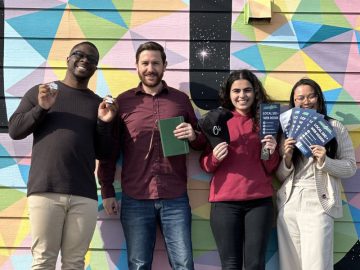Running and maintaining global websites is not an easy task.
The good news is there are new AI tool solutions available that ease some of the work that goes into website management as well as assisting with SEO efforts.
AI technology is advancing rapidly and has been adopted into different work streams and all areas of marketing.
However, AI is not perfect and still needs refinements and human interaction. But that should not stop us from exploring and testing it out.
Here are ways you can benefit from AI to make your work with global websites more efficient and productive in areas including content, SEO, research, and management.
Global Website Content
Creating relevant content and publishing it on multiple websites in different languages requires plenty of resources. This is one of the big challenges and unavoidable tasks with global websites.
Content Translation and Localization
In the past, I always advised against using machine translation to translate original content to other languages. I hadn’t found any translation tools that produced satisfactory quality output, especially for Asian languages.
I’ve been testing different AI-powered translation tools lately and found their quality to be much improved. However, it is still not the same quality as the work of skilled human translators.
My suggestion is to use the AI tools as “go-between” solutions. Because this is one area where a lack of resources (both manpower and budget) holds the entire project back, I think it’s worth a try.
Text Translation And Localization
Let the AI tools handle the initial translation work. It still needs to be edited by humans, especially if the content covers specific industry knowledge, but at least it is in the correct language.
Before you deploy it site-wide, create the prompt based on several tests.
Prioritize the content (by type, category, dates, etc.) for human editing.
Duplicate Content
Use AI to check for duplicate content in the CMS. You can then decide whether to keep or kill reported content.
Having duplicate content is not necessarily a negative issue. Many global websites have content in the same language but each targeting a different country.
In this case, AI tools can help quickly localize the content for each target country by changing the spelling, currency, measurements, addresses, etc.
Image ALT Text Creation And Translation
The image ALT tag has been overlooked for many years. Many websites don’t use it.
Even if the main site uses it, the regional sites don’t have translated text in ALT tags. There are multiple solutions available now with AI tools baked into the image file management systems.
Some use Google’s Vision API to identify the key elements of an image and create appropriate text for the image to be auto-localized.
User Generated Content (UGC) Translation:
Because of the nature of the UGC, it is a huge challenge to translate the content as it is created.
The machine translation with an AI-powered review process is perhaps the best option out there.
Content Creation
Having content that is designed for the target audience in a specific country/region is one of the keys to a successful business.
You sometimes see a small company beat a large corporation in the online realm because a small business has an advantage in its deeper understanding of its local audience.
With the AI-assisted research project, you could quickly identify content gaps and content that satisfies the local audience’s needs.
Content Topic And Opportunity Research
AI tools can help shorten your local audience research process. It can identify the locally unique search demand and different types of information people look for in different countries or regions.
The research may also be used to identify the content gap between your site and competitor sites and give you an idea for locally unique FAQ content. You may also learn that unpopular items on the main site could perform much better in another country.
Other Ways To Improve Content
Localized Images
Images on websites support the understanding of products, corporate messages, and more. You may want to replace some images with more acceptable ones in some countries.
For example, create images with Asian models for websites targeting Asian countries.
Video Transcription And Translation
Transcribing the videos and translating them are other items I often see on the to-do list, but they are always pushed down on the priority list.
International SEO
In addition to content-related work, AI tools can support other international SEO action items.
From the technical SEO standpoint, AI tools can help in many areas, including the below:
- Hreflang tag URL mapping review.
- Tags and codes auto-generation review – language tag, title tag, meta description, canonical tag, etc.
- Schema markup review.
- Finding broken or unnecessary codes.
Depending on the size of the websites, these tasks could take many resource hours, especially for multinational and multilingual sites. With the help of AI tools, you can focus on improving the sites rather than finding them.
You can also let the AI tool analyze site crawl reports to find patterns in broken links and broken redirects and even suggest where to set redirects based on relevance and other technical SEO issues across the sites.
Data Analysis And Global Website Management
If you manage global websites or international SEO work, you know how important it is to have the same data points, KPIs, report templates, and best practice guidelines across countries.
Strengthen the governance of your global website management with AI tools.
Example Tasks
- Add visualization of data in the performance reports.
- Competitors analysis in each country and language.
- Research local regulations.
- Create visualization of task process and guidelines.
- Audience analysis to create local personas.
Conclusion
We should embrace technologies such as AI tools to make our work more efficient and cost-effective. However, remember that AI tools are supporting tools and should not completely replace the work of humans.
As mentioned previously, AI tools are not perfect, and you should not let them auto-run. It is important to test the quality of their output prior to deployment.
Because of its dynamic learning capability, you want to test and improve prompts, requirements, etc., especially at the beginning.
Human reviews should be part of the process, and the settings should be updated or modified as needed.
More resources:
Featured Image: Fah Studio 27/Shutterstock





